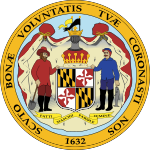| ||||||||||||||||||||||||||||||||||
All 141 seats in the Maryland House of Delegates 71 seats needed for a majority | ||||||||||||||||||||||||||||||||||
|---|---|---|---|---|---|---|---|---|---|---|---|---|---|---|---|---|---|---|---|---|---|---|---|---|---|---|---|---|---|---|---|---|---|---|
| ||||||||||||||||||||||||||||||||||
 Results: Democratic gain Republican gain Democratic hold Republican hold | ||||||||||||||||||||||||||||||||||
| ||||||||||||||||||||||||||||||||||
| Elections in Maryland |
|---|
 |
|
|
The 2018 Maryland House of Delegates elections were held on November 6, 2018, as part of the biennial United States elections. All 141 of Maryland's state delegates were up for reelection.
Prior to the election, there was little doubt that Democrats would hold their majority in the chamber. Maryland's House of Delegates has had a Democratic majority since the elections of 1920, and it remains a solidly Democratic in elections at both the national and state level. Still, there was some discussion about whether or not Republicans would be able to make inroads in the chamber, especially considering that popular incumbent governor Larry Hogan was running for reelection at the top of the ticket simultaneously. These hopes were not met; though Hogan won his race by double digits, there was very little down-ballot appetite for Republicans, including in the House of Delegates.
Democrats picked off eight seats from Republicans, while Republicans flipped one seat from Democrats. The result was a net gain of seven seats for the Democrats, which came from across the state. Six counties had seats flip to the Democrats, including two in Baltimore County. The one seat Republicans did pick up was in a conservative Anne Arundel County district where a retiring incumbent had switched parties from Republican to Democratic the month before the election.
Overall, the results were a seen as a disappointment for Republicans, who had hoped Hogan's success would carry more Republicans to Annapolis. After the elections, Democrats held 99 seats to the Republicans' 42, meaning Democrats were in possession of more than 70% of seats in the chamber—maintaining their three-fifths supermajority capable of overriding gubernatorial vetoes. Many factors contributed to the Democrats' gains, but President Donald Trump's unpopularity in Maryland, as well as the state's large and growing minority population and its heavily suburban nature, were among the most important.

